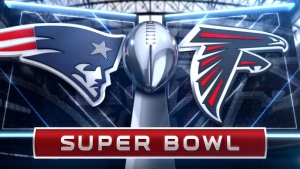
Michael Layer, Sports Editor
February 15th, 2017
In a nation of hyper-partisan division, one of the largest forms of escape was in Sunday’s Super Bowl. Many people enjoy sports because of their escapist nature and, according to Nielsen, the Super Bowl is the most watched event in America. Though politics and sports have clashed in the past, according to New York Times article “No Trump or Goodell at Super Bowl, at Least According to N.F.L. Transcripts,” they were not intended to clash this year.
Since the controversial presidential election, private businesses have seen their stock rise or fall from a Trump endorsement. Because of the manner of Donald Trump’s election, his opponents have complied lists of companies to boycott, while his supporters laud the companies’ alleged decisions to commit to American jobs. After the election, centrists and conservatives condemn the political protests from democrats and proclaim a message of national unity behind President Trump and varying degrees of political tolerance.
The Super Bowl is seen as a hallmark of American Culture. The sporting event brings in millions of viewers annually, attracting Americans both for the football and the commercials. Businesses pay millions of dollars for their 30 second opportunity to be seen by Americans nationwide. The commercials face their own sort of competition and are often compared for their creativity, irreverence, and comedy. Outside of sports, comedy shows have recently criticized Donald Trump through satire, committing to a left leaning, niche audience and at the same time attracted national attention, an increase in ratings, and a tweet from the president.
At a time where it can become profitable to overtly oppose the current president, how did America’s marketing geniuses do? It seems with a strong message of ambiguous tolerance with overtones of national pride that appeals to both sides of a partisan divide.
To certain Trump supporters who feel that they are ‘the silent majority,’ who feel they have been ignored by President Obama, tolerance means to settle Democratic protests, quiet celebrity dissent, and settle a perceived news media bias. Tolerance, it seems, has nearly the opposite implications for Trump’s critics. This message of equality implies the importance of national and international diversity, shaming travel bans, proposed walls, and understood religious discrimination.
National pride was another emphasized, yet unclear message from the Super Bowl. The same nationalistic rituals of patriotic hymns, references to constitutional rights, and images of flags resonated with a proud, patriotic right. On the left, these same themes referenced integral, American rights of freedom of religion, a unified nation of immigrants, or equal representation under the law.
Out of the many messages from the Super Bowl, one best combined these two ambiguous, pandering appeals to identity politics: the Lady Gaga half time performance. She began the performance with “This Land is Your Land,” which utilized an impressive red and blue light show that became an American flag, and emphasized that America was “one nation, under God, indivisible, with liberty and justice for all.” Being one of the leading voices for the gay, lesbian, and queer community, she sang her hits like such as “Born this Way” in front of Vice President Mike Pence, who has been openly critical of gay, lesbian, and queer rights. In the bottom right of the performance broadcast was the red, white, and blue Pepsi logo. After the remarkable performance from the pop artist, who employed a diverse team of dancers, the red and blue lights reappeared, and formed the Pepsi logo in the sky.
The right was emboldened behind their new president and renewed national pride while the left was inspired by messages of promised liberties and equality that Donald Trump cannot revoke. The right was promised that Lady Gaga would not make her performance a political message, while the left could infer the meaning behind her songs. It seems that the heavily publicized event was deliberately ambiguous, both satisfying and disappointing expectations from both sides.
It seems that several companies played into a similar marketing strategy. Coca-Cola and Budweiser seemingly played into this with their uniquely courageous yet marketable commercials. There was one in particular which seemed to almost comment on this pandering appeal to identity politics. Kia produced a commercial with Mellissa McCarthy, nearly 24 hours after her satirically scathing SNL impersonation of White House Press Secretary, Sean Spicer.
In the ad, she goes around the world protesting aspects of the continued degradation of the natural environment. She quickly realizes the dangers of jumping in the ocean to save the whales, climbing trees to prevent deforestation, or standing on melting polar ice caps, and lets out an outrageously dramatic yelp, as Bonnie Tyler’s “Holding Out for a Hero” plays. The right can enjoy the downfall of a liberal stereotype, while the left sees the importance of driving a car that is environmentally conscious.
It appears that Kia’s advertisement capitalized on McCarthy’s unfruitful protest. It seems that while most voting Americans picked sides, every participant of the Super Bowl marketed themselves to both sides of the political spectrum by refusing to compromise.
